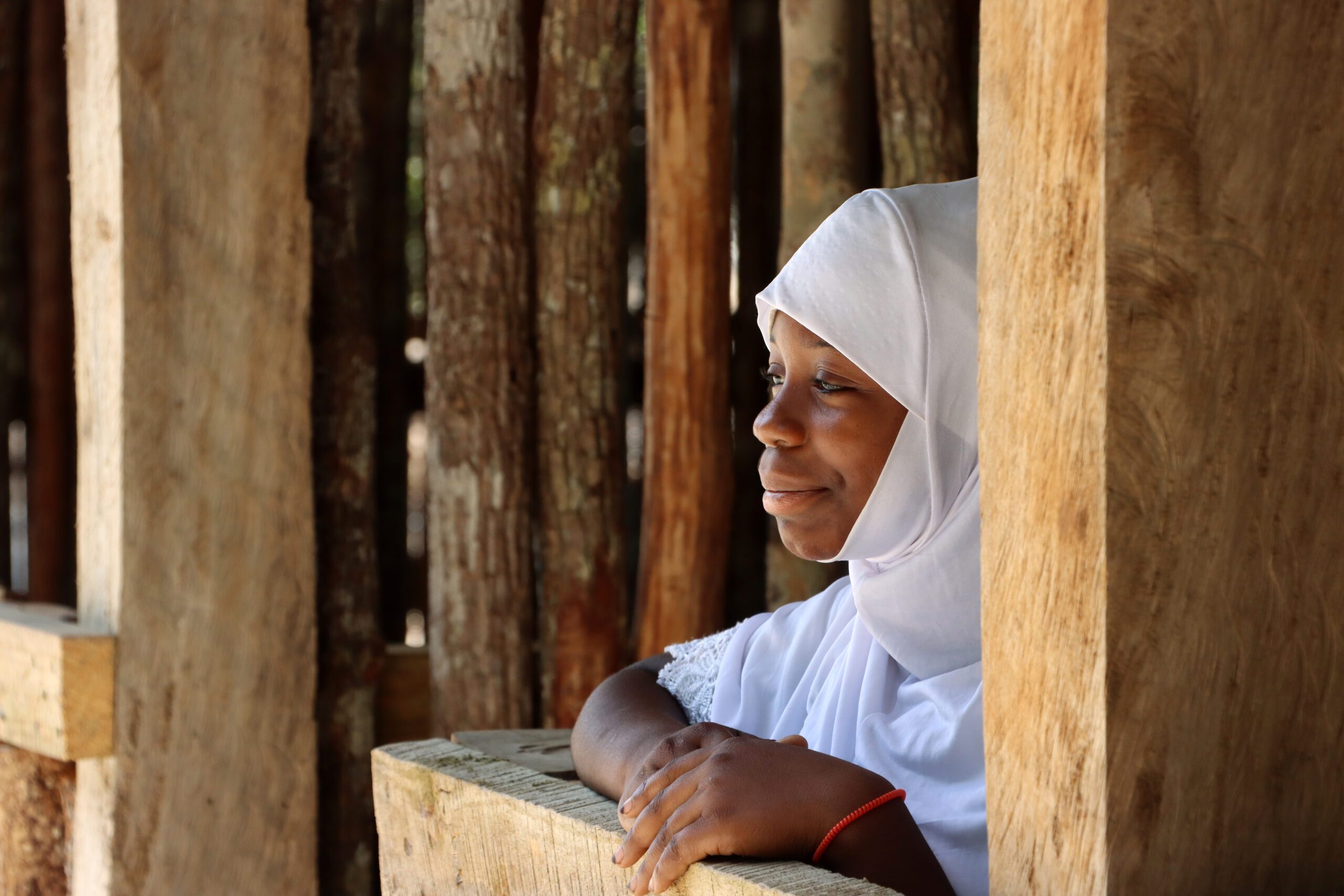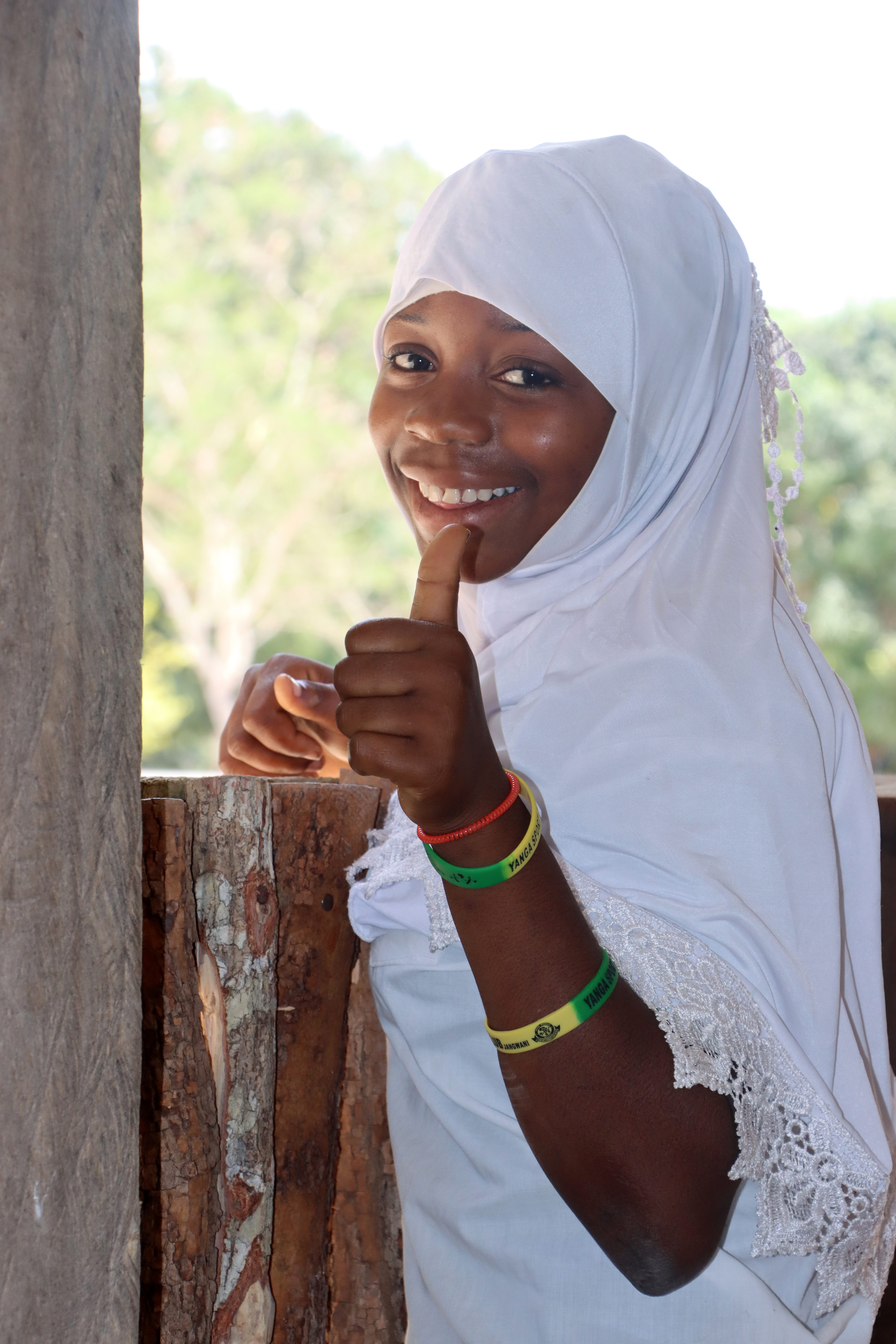Tomasina finds joy in learning after living in the forest for a year
When violence broke out in Cabo Delgado province in northern Mozambique, Tomasina took refuge in the forest and only after a year was able to return to her village and go back to school.
Smiling as she recalls her life before her village was attacked by armed men, Tomasina, 15, says: “Our life was very simple because we didn’t have many resources. We had a house and a field where we grew maize, pumpkin, cassava and some vegetables. I went to school and helped my mother in the afternoon. It wasn’t much, but we were happy.”

In 2021, the simple life she knew was thrown into turmoil when violence broke out in her province of Cabo Delgado in northern Mozambique. Her village came under attack and she was forced to flee with her mother, stepfather and 4 siblings.
“When the bandits came to our village, we saw them in the house next door and we immediately ran away. The house was empty and they set it on fire and when they saw us running they started shooting at us. We kept running and got into the forest. I was scared, but I managed to survive with my whole family and no one was hit by the bullets.”
The family remained hidden in the forest for months as clashes with the defence and security forces continued nearby. Unlike many other families who decided to move to safer areas, Tomasina’s family decided to stay in the forest near their village, hoping to return to their lives once the fighting stopped.
“When we fled, we left our house and all our possessions without taking anything with us,” Tomasina explains. “We hid in the forest for a year and ate only sweet potatoes or cassava, which we boiled with water we collected from a lake near where we were hiding.”
While living in the forest, Tomasina and her brothers were unable to study. All the nearby communities had fled and there were no fully functioning services. “During the time we were hiding in the forest, I missed our old life and my routines. I missed school and my classmates and teachers. We left so suddenly that I didn’t even take my notebooks with me,” says Tomasina.
The long months in the forest were a great challenge for the family, a real test of their resilience. Several other families had also decided to hide in the woods and everyone helped each other. On calmer days, some even risked returning to their village to fetch household items, a pot or an axe.
The area of the forest they chose to hide in gave them a sense of security and they could see from a distance if anyone was approaching. Despite this, everyone lived on constant alert in case they had to leave at a moment’s notice. After a year in the woods, the security situation improved and the family decided to return to their village.
“In 2022, as soon as the attacks ended, we returned to our community because we were not far away,” says Tomasina. “We were surprised to see that our house was intact and had not been burnt down. Only the furniture was missing and some utensils had been taken, but everything else was fine.”
In the months that followed, more and more people began to return to the village and resume their lives. The health center started operating again, the government offices reopened and, most importantly for Tomasina, the teachers returned to the school and classes resumed.
Tomasina’s joy at going back to school

“I like to study and gain knowledge. My dream is to become a teacher and I hope to be like the school principal one day because she is very intelligent and wise,” says Tomasina. By 2023, the number of students at the small school was beginning to overwhelm the facilities, with new returnees enrolling every month.
To support their return to the classroom, Plan International implemented an Education in Emergencies project to restore access to education in a safe and protected environment. Dilapidated classrooms were renovated and new classrooms were built using local materials to allow more students to learn indoors rather than outside under the trees.
“I was very happy because we also received notebooks, books, folders, pens and other school supplies. Today I even have a uniform. I would like to have a backpack to carry the weight of my notebooks and books. I would also like the number of toilets to be increased as there are many students in this school,” says Tomasina.
Tomasina’s concerns are shared by many other children affected by the war in Cabo Delgado. “I know friends who have dropped out of school for different reasons. Some of them say that school is not for them, others because they got married or pregnant. I have tried to get them to go back to school, but they say they are tired of studying and want to help their parents instead.”
In times of crisis, families often encourage their daughters to marry in order to ease the family’s financial burden. “I think this is wrong,” says Tomasina firmly. “If I were President of Mozambique, I would hold a meeting to tell parents and guardians that children should focus on their studies and not on marriages while they are still young.”
“I have learnt this from the talks I have attended in my community and also here at school, given by Plan International together with the teachers. In the last one I attended, they told us that we should not get married while we are still children. There are many children my age who have married much older men and dropped out of school. This must stop.”
About the Emergency Education and Protection project
Plan International’s Emergency Education and Protection project, funded by the European Union, aims to restore access to education in a safe and protective environment for children affected by conflict in Cabo Delgado, northern Mozambique. The three-year project (2023-2025) operates in the districts of Mueda, Nangade, Mocimboa da Praia and Palma to reach 65,305 children and young people, including 34,920 girls and 30,385 boys.
The protection component poses several challenges due to the large number of children and adolescents returning home traumatised and from situations where their rights have been violated in some way, resulting in several cases of children and adolescents in need of psychosocial support. Often these children find it difficult to return to school or drop out early due to child marriage or teenage pregnancy.
Through our working partner, HelpCode, we are also implementing protection initiatives to improve the well-being of children affected by the conflict. Through games, psychological support and educational initiatives, children in Cabo Delgado are regaining a sense of control over their lives, where learning becomes a form of resilience.
Categories: Education, Emergencies, Protection from violence


